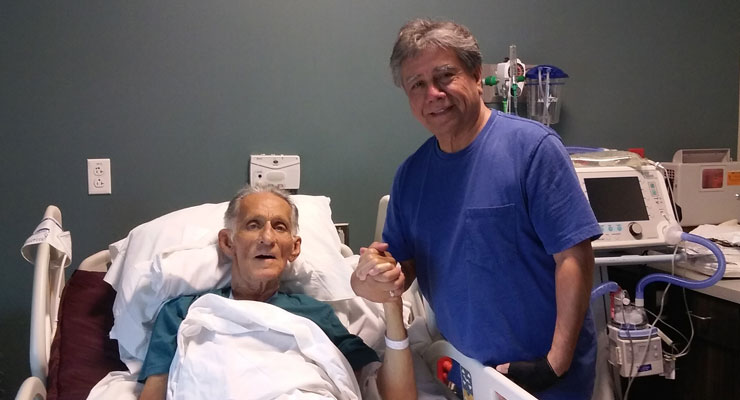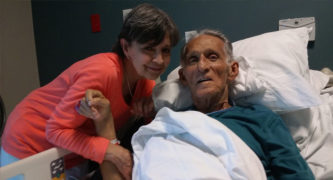
Back in the early seventies I wrote for El Renacimiento, a community newspaper whose editor told me he borrowed the name from Pablo Neruda’s poem Un Canto Para Bolivar, where he wrote “I wake up every one hundred years” alluding to populist movements.
Around the same time, I hosted Ramsey Muñiz in Michigan where he was bringing his campaign for the Texas Governorship as a Raza Unida Party candidate informing migrants with Texas residency the importance of the absentee vote.
As history goes, Ramsey’s support sent shockwaves to the traditional two-party system by receiving a hefty support thus cementing Chicano political power.
Ramsey’s political activism took a downturn after a set of drug related convictions which ended in a life prison sentence without possibility of parole. Dr Andres Guerrero, in his book Freedom, Justice, and Love profiles Ramsey’s endurance of close to three decades imprisonment including five years in solitary confinement, as a deeply spiritual man who hasn’t lost his sense of justice, resistance and visions of liberty for himself and people behind him.
All throughout there were numerous appeals made to the Bush, Obama and current administrations for Ramsey’s parole release and constant echoes across the southwest of Free Ramsey community campaigns involving marches, public demonstrations, lobbying and letter writing drives, along with regular visits by Irma, Ramsey’s wife and Dallas activist Monica Acosta-Zamora watching over his ailing health.
Since I had met Sister Monica during the coordination of the support campaign for the families of the 43 disappeared students from the Ayotzinapa teaching academy in Mexico, I told her, “Next time you visit Ramsey, tell him when he’s out we’ll take him on the road” utilizing the network of national contacts we developed in the Ayotzinapa support caravana.
As sincere a wish as it was, I thought of it as a long shot knowing that if Ramsey hadn’t been released by Obama, his chances of even being considered for parole under the current hostile political climate would be literally impossible.
I had a chance to meet Ramsey for a second time in the late seventies while he was a resident in the McNeal Island facility in the Seattle/Tacoma area. It was an accidental encounter during one of my visits to members of MASO, the Mexican American inmates’ organization. At the time I was the producer of Radio Cadena News Service, the first and only National Chicano information service of its kind distributed daily to 85 stations around the country, so customarily I would always carry my tape recorder along.
 Weekend visits to the brothers in McNeal was a trip. Regardless of the circumstances by which they had ended up in a federal institution, I remember our visits always being a pleasant and uplifting experience. Social work theory behind service with inmates is based on the premise that these individuals are temporarily removed from society and eventually will rejoin their families and community. Our take as Chicanos was parallel with a cultural approach and understanding that the brothers needed to feel connected with the outside by bringing to them Mexican food, music, entertainment and general support from the Barrio.
Weekend visits to the brothers in McNeal was a trip. Regardless of the circumstances by which they had ended up in a federal institution, I remember our visits always being a pleasant and uplifting experience. Social work theory behind service with inmates is based on the premise that these individuals are temporarily removed from society and eventually will rejoin their families and community. Our take as Chicanos was parallel with a cultural approach and understanding that the brothers needed to feel connected with the outside by bringing to them Mexican food, music, entertainment and general support from the Barrio.
Oddly enough, the prison guards were of opposite opinion arguing that our visits and interaction with the residents gave them false hopes and expectations, that it would be much better to leave them alone and let them do their time. One guard told me once, “you should see these boys ironing their khaki pants and shirts and spit shine their shoes over and over days before you come to see them, you should just leave them be”.
During our visits the president of MASO often facilitated interviews for me and this particular Saturday he asked me if I wanted to see Ramsey. “Muñiz?” I asked. He said, “yes, they brought him in last night”. Later I found out Ramsey was constantly moved around without previous notice to him or his family, possibly part of being considered a dangerous case.
When Ramsey came out, he looked alert, nice and fit so after greetings I asked him if I could record him to which he agreed. It was not an interview per se, with someone as eloquent as Ramsey few questions are needed. I do remember he related the poor conditions he had heard from the fellow residents, “some of these people shouldn’t even be here, all they need is the right legal representation” he said.
On Monday, Ramsey was the main item in our newscast and before noon, we were getting calls from his family in Corpus Christi where the interview had been aired over KUNO.
Literary critic Susana Marín, writes about Neruda’s poem, “In every war, in every moment that is necessary, a Bolivar, a liberator, appears to lead, to march with those who fight for democracy — and serves as a reminder to the people that they are fighting to make their country much better, so that all people can live with dignity”.
As such, seeing Muniz as a symbol more than just the individual, it’s not difficult to understand the political impact he had on Chicanos so implicitly when they advocated and prayed for his freedom it actually meant a cry for their own liberation.
And on December 10, 2018 the miracle of miracles happened. Ramsey was given another chance to life when he was released by the Federal Bureau of Prisons, not pardoned by the president but as a humanitarian release due to his poor health.
Ramsey was released to his family although in reality he went straight into a hospital where he has struggled to barely stay alive as his decaying health condition lingered even off the reach of the institution.
I finally had an opportunity to visit Brother Ramsey in the hospital where he is still in recovery but at least out of Intensive Care. It was a very moving short visit after the different circumstances in which we had met the first time and the many twists and turns along our life journeys.
As we shook hands, I told him my memories of him though not expecting to remember me. He smiled and said “You look a lot older”. That sense of humor told me his spirit was as strong as ever, so I said “as soon as you’re ready we’ll take you on the road for a speaking tour” to which he nodded.
As I was out the door, I heard him say “We’ll call it The Rebirth” and Pablo Nerunda’s words rang in my head “Despierto cada cien años cuando despierta el pueblo”. El Renacimiento, I thought.
Dr Andres Guerrero says
Doc
Very good article. I agree w/Neruda and add Messengers from God Almighty.
Ramsey is one of them. We cannot believe how much he and Irma suffer. Add Norma to the list who also attends to Ramsey. God y LA Virgen have not and will never abandon us. God is omnisciente, omnipotent and all loving.